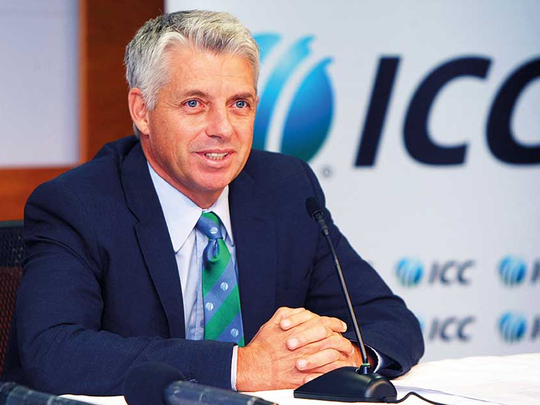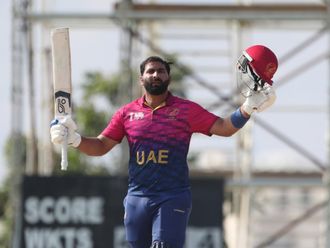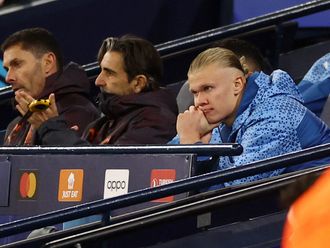
Bengaluru: Claiming the 50-over Champions Trophy was “too similar to a World Cup”, ICC Chief Executive Dave Richardson on Thursday said the next edition of the tournament, in 2021, will be converted into a World T20.
“The Champions Trophy, in a way, was too similar to the World Cup. It was difficult to differentiate,” Richardson told reporters at a press briefing held at the end of a five-day ICC quarterly meet here.
“The new FTP (Future Tours Programme 2019-2023) not only includes the fixtures in the league but it would also comprise of the two World Cups — the 50 over World Cup in 2019 and 2023.
“It will include the World T20 in Australia, both men’s and women’s. It will also include at this stage the Champions Trophy in 2021 but in all likelihood we have decided that we would change it to World T20 and that fits in with our strategy now to use the T20 cricket as the way of growing the game by virtue of having it twice in every four years instead of once.”
“The World T20 will give more teams the chance to play in global events,” Richardson added.
The Board of Control for Cricket in India (BCCI) was against the proposed idea of the Champions Trophy being made into a World T20, but Richardson said the Indian board’s acting secretary Amitabh Chaudhury had voted in favour of the move.
“As far as the conversion from Champions Trophy to World T20 is concerned, the BCCI representative attended the meeting when that happened and the vote was passed unanimously. So I don’t think that’s an issue,” the former South Africa wicketkeeper said.
Asked about tax issues affecting India in hosting the 2021 event and the 2023 World Cup later, Richardson said: “The tax exemptions I will leave aside for the moment. Obviously, at this stage anyway, the event is scheduled for India and so is the World Cup in 2023. We want to work with the BCCI in trying to secure a favourable tax situation.”
The Indian government refused to exempt the 2016 World Twenty20 leading to the ICC suffering a revenue deficit. Since then, the BCCI has tried desperately to alter their stance, but to no avail.
There will be a World T20 in Australia in 2020 followed by another T20 meet, replacing the Champions Trophy next year.
Richardson said they were forced to schedule it in such a manner due to bilateral series commitments of teams.
The former Proteas stumper said from then on, there will be World T20s every two years.
“It’s a little bit unfortunate we are having an event in 2020 and twelve months later we are having another one, unfortunately that is because of the schedule. There would have been an option of moving the 2021 T20 into 2022, but with the bilateral series going on we couldn’t.
“Going forward, every two years [we will have] a World T20, every four years the World Cup and the ODI league building up to each World Cup,” he said.
Richardson was asked about the ICC Test Championship not having India and Pakistan in the first FTP cycle, and keeping in mind the political tension between the two nations, how does ICC plan to go about it?
“In the case of India and Pakistan we have been a little pragmatic. In the first cycle, they are not playing Test matches,” he said
The ICC has also asked an internal panel to suggest harsher punishment for ball-tampering and other misbehaviour by players in its bid to establish a “culture of respect”, according to Richardson.
The game’s image was sullied in Cape Town last month when Australia batsman Cameron Bancroft was caught on camera tampering with the ball during the third test of the ill-tempered series against South Africa.
Bancroft, then captain Steve Smith and opener David Warner, were promptly sent home and handed hefty bans by Cricket Australia.
Richardson said the punishments under its code of conduct for such misbehaviour were inadequate.
“We want to move towards stricter and heavier sanction for ball-tampering and all other offences that are indicative of a lack of respect for your opponent, for the game, for the umpire, for fans, for the media etc,” he said.
“We want penalties in place, which act as proper deterrent. Fines are not proving to be the answer.”
ICC’s Cricket Committee, chaired by former India captain Anil Kumble, will review the current ICC code of conduct and recommend suitable punishments for rogue behaviour.
“We’ve got the spirit of cricket in the laws but we need to define it in the modern day and age,” Richardson said.
“Both the CEC (Chief Executives’s Committee) and the board were very supportive of trying to develop a culture of respect across the game, both on the field and off the field.
“Hopefully, through these actions of reviewing the code of conduct and developing a culture of respect… we will achieve that goal.”
Borrowing football’s red and yellow cards and handing out instant punishment would be considered, though Richardson was sceptical about the idea of using cards.
“Whether we introduce red or yellow cards, we’d leave it to the committee. I’m not convinced that it would as easy to implement as it is in other sports.”
The quarterly ICC meeting also acknowledged Twenty20 cricket as the vehicle to globalise the English game, and has decided to grant international status to all 20-over matches between its members.
Richardson said it could prove a major step towards cricket’s Olympic inclusion at the 2028 Games in Los Angeles.
“Assuming that we get all of cricket united in the desire to be part of the Olympics, we will have a very good chance of persuading the IOC (International Olympic Committee) that cricket can add value to Olympics.
“Already we’ve missed the boat for applying to the IOC through the front door, we can’t go to Paris. We’ll continue to talk with LA in due course, and hopefully by 2028 we will have cricket in the Olympics.”












